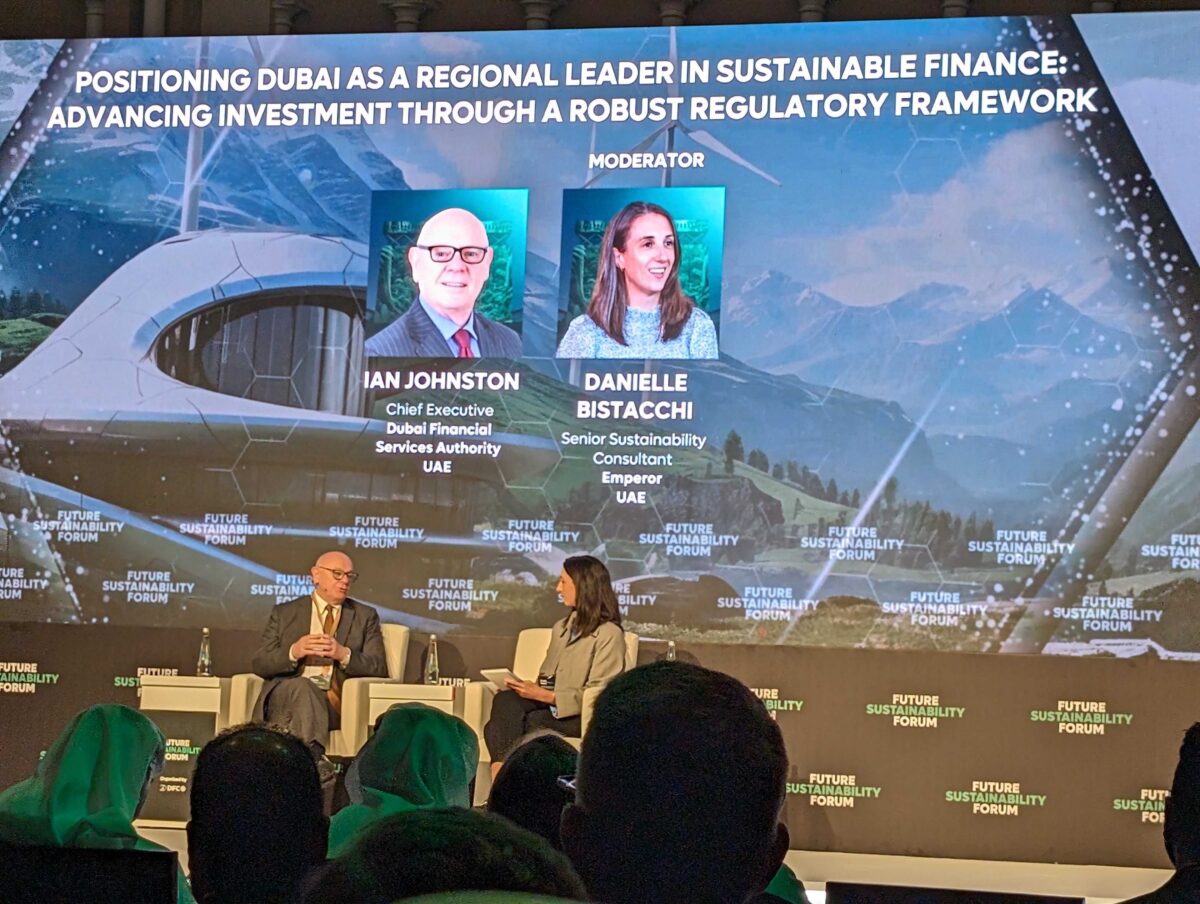
Back again in Dubai for its second edition, the DIFC‘s Future Sustainability Forum took place in the Madinat Jumeirah over 4 to 5 December, bringing together 3,000 participants to discuss environmental conservation and social equity innovations.
The Future Sustainability Forum 2024 addressed critical sustainability issues across eight core pillars spanning different industries including banking and finance. We got the opportunity to hear from some of the brightest minds in the financial industry and share our highlights from the event on how the sector can change its ways to become more environmentally friendly.
Advancing investment through a robust regulatory framework
Following opening remarks from Alya Al Zarouni, chief operating officer at DIFC, the first fireside chat took place between Ian Johnston, chief executive, Dubai Financial Services Authority, and Danielle Bistacchi, senior sustainability consultant, Emperor.
One of the first topics explored by Johnston was the role of financial institutions in driving an environmentally friendly financial ecosystem. Both he and Bistacchi recognise that the DFSA is not an environmental regulator, but a financial services one. However, Johnston notes that the UAE has made its position on becoming net zero incredibly clear, which means that while the DFSA is not setting environmentally friendly policies, it is helping enforce them in its sector.
Johnston explains: “The DIFC and Dubai have very clear priorities about wanting to be leaders in sustainable finance and it is our job as the regulator, to help create an environment, the market infrastructure, and a financial ecosystem that allows this to happen.”
He continued: “Our job is not to set the environmental targets and support one company over another. Our job is, once those targets have been set by policymakers, to give effect to them.”
Looking at how the UAE can continue to be a beacon for other regions in terms of sustainable finance, Johnston noted three key pieces of work:
Developing principles for regulation in respect of climate-related financial risks, which has now been completed.
Comparing disclosure frameworks for reporting entities around the globe and applying them in the UAE.
The development of new taxonomy.
Partnership for progress: uniting for climate action
Another standout panel was moderated by Karl Tlais, founder and chief executive officer of iAdvisory who spoke to:
Kyung-Ah Park, head of ESG investment management and managing director of sustainability, Temasek
Jane Goodland, group head of sustainability, London Stock Exchange Group
Sameera Fernandes, chief sustainability officer and board member, Century Financial
Mohammad Hanif Al Qassim, chief operating officer, CSR UAE Fund
The panel began by Park discussing sustainable living, climate transition and ESG integration. “We engage and encourage our portfolio companies to think about ESG value creation as well as transition readiness… This goes very much hand-in-hand with long-term sustainable value as well as future-proofing their firms.”
Ending her initial answer by putting a spotlight on partnerships, Tlais then turned to Goodland who further emphasised the importance of market infrastructure and partnerships to create impactful sustainable finance initiatives. Further exploring the sustainable shift that is taking place, Fernandes highlights that over 65 per cent of investments in the financial sector now have sustainable finance goals.
A word from Trescon
In between the excitement of panels, we got to hear from Naveen Bharadwaj, CEO of Trescon, who shared his joy and thankfulness for everyone’s attendance at the event as well as their eco-first mindsets. Stressing the importance of being sustainable, Bharadwaj thanked the partners that made the event possible before announcing a new initiative which would see the firm plant 10,000 trees.
“We want to walk the talk, and at the same time, we also want to have conversations with friends to take those small little actions that they possibly can at their individual capacity or in their professional capacity. So I’m happy to announce that we are planting a minimum of 10,000 trees.”
Leading by example again, Bharadwaj made it clear that sustainability is not a competition and that each company and, in turn, individual has a responsibility to play their part. “We’ve committed internally to measure our carbon footprint and take conscious decisions towards reducing a carbon footprint. Whether or not we can run as fast as you are, I don’t know whether or not we can get to our net zero in a year, two years, five years or 10 years, I don’t know. But we just wanted to start somewhere.”
The post A Brighter and Greener Future: Future Sustainability Forum 2024 Highlights appeared first on The Fintech Times.
